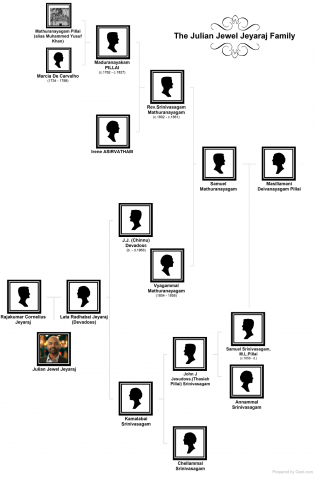Julian Jewel Jeyaraj, a technology evangelist and creator of Julian Jewel’s Artificial Intelligence Bot (JJAIBOT) while researching into his ancestry encountered a Palayamkottai mystery. With the help of his relatives, Julian traced his lineage back to his great, great, great, grandfather Maruthanayagam Pillai.
The full family tree is available at https://www.geni.com/family-tree/index/6000000082256141860.

Maruthanayagam Pillai alias Muhammad Yusuf Khan, a military genius with British, who later went against them to establish his own rule in Madurai, is a folk hero in Tamil Nadu, India. He is acclaimed as one of the finest military leaders of the pre-Independence era, the other being Hyder Ali of Mysore.
The missionary Robert Caldwell mentioned Yusuf Khan in his book, “His whole administration denoted vigour and effect. His justice was unquestioned, his word unalterable; his measures were happily combined and firmly executed, the guilty had no refuge from punishment.”. It concludes by saying that ‘wisdom, vigour, and integrity, of no climate or complexion, have surpassed his.”
Kansa Mettu Theru, the deviated name of Khan Sahib Mettu Theru near Meenakshi Amman temple, is a street named after this military genius. Muhammad Yusuf’s residence is believed to have stood here and it was here where he was captured treacherously and hung. It is said that his body was mutilated after his death and his body parts were sent to various places to instill fear among the public.
Born in 1725 as Maruthanayagam Pillai in Saiva Vellalar community at Panaiyur in Ramanathapuram district, he deserted his house at a young age and left to Puducherry. There, he tried his hands in menial jobs to make a living. He also converted to Islam during this period and was named Muhammad Yusuf Khan. He was popularly known as Khan Sahib when he became a ruler of Madurai.
According to scholars, initially, Yusuf Khan joined Tanjore army as a foot soldier. Quickly he acquired higher ranks and moved to Nellore where he was referred as Nellore Subedar in English records. Trained under Major Stringer Lawrence, Yusuf Khan had reached the zenith of his career as an exceptional military commandant by 1760. Later, he was sent to Madurai in 1756, after the fall of Nayak rule in Madurai, to collect taxes as the representatives of Arcot Nawab were inefficient in doing so.
But shortly afterward, he disputed with Arcot Nawabs and his British superiors to establish his own rule in Madurai. Yusuf Khan also managed to suppress the revolting Poligar kings. Experts here say that various parts of Madurai flourished under his rule. He got water bodies repaired for agriculture and provided security for traders and fortified Madurai city. Yusuf Khan was hanged in the year 1764 after a period of brief rule in Madurai.
“He would have remained invincible if he was not captured by treachery. It is believed that he was hung on Kansa Mettu Street where his residence was present. His body was mutilated into several pieces and the torso was buried in Sammatipuram, in the outskirts of Madurai,” said C Santhalingam, an archaeology scholar in Madurai.
Media Contact
Company Name: Media Line
Contact Person: Hugo Magallan
Email: Send Email
Country: United States
Website: https://www.geni.com/family-tree/index/6000000082256141860
